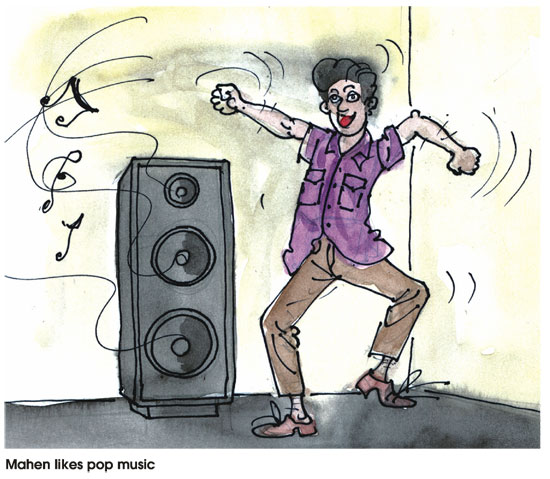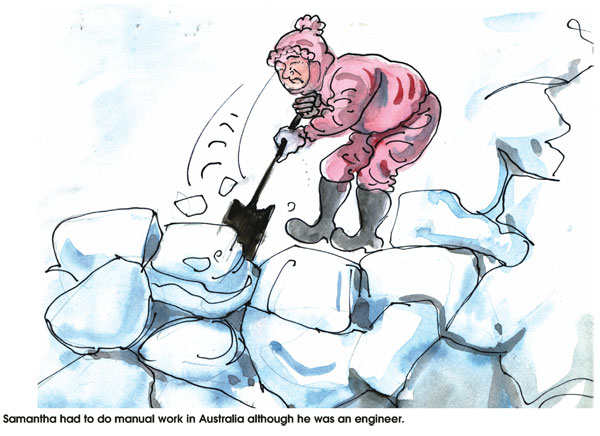|

by R. S. Karunaratne
‘Yes’ and ‘No’ questions
As a rule, all ‘Yes’ and ‘No’ questions begin with a verb.
Note how the following statements are turned into questions.
Statements
This car is yours.
Mary has left the country.

The train will be late.
You can pay now.
The children can play in the park.
You are ready.
She has telephoned Amanda.
You are tired.
Nanda is at home.
They can speak French fluently.
Questions
Is this your car? / Is this car yours?
Has Mary left the country?
Will the train be late?
Can you pay now?
Can the children play in the park?
Are you ready?
Has she telephoned Amanda?
Are you tired?
Is Nanda at home?
Can they speak French fluently?
If there is no auxiliary (helping) verb, use ‘do, does’ did’ before the
subject. You also have to use the infinitive without ‘to.’
Statements
You need a drink.
Harry wants to go home.
You knew Brown.
You understand English.
She called me last night.
He drinks coffee in the morning.
Mahen likes pop music.
Sam drove the bus.
Brian works in Tokyo.
Kasun plays Tokyo.
Questions
Do you need a drink?
Does Harry want to go home.
Did you know Brown?
Do you understand English?
Did she call me last night?
Does he drink coffee in the morning?

Does Mahen like pop music?
Did Sam drive the bus?
Does Brian work in Tokyo?
Does Kasun play football?
[Activity]
Make ‘Yes’ or ‘No’ questions and check your answers with the key.
1. The minister travels a lot.
......................................
2. Eva and her husband have arrived from London.
.......................................
3. The teacher is talking to the principal.
........................................
4. All the people are going to vote for him.
.........................................
5. Members of the cricket team played well.
...........................................
6. Everybody in this office is working hard.
............................................
7. A man carrying a gun entered the bank.
............................................
8. The 6.10 train for Colombo fort leaves from platform No. 2.
.............................................
9. You have been to Malaysia.
.............................................
10.Suramya is looking for a job.
.............................................
***********************
Key:
1. Does the minister travel a lot?
2. Have Eva and her husband arrived from London?
3. Is the teacher talking to the principal?
4. Are all the people going to vote for him?
5. Did members of the cricket team play well.
6. Is everybody in this office working hard?
7. Did a man carrying a gun enter the bank?
8. Does the 6.10 train for Colombo Fort leave from platform No. 2.
9. Have you been to Malaysia?
10. Is Suramya looking for a job?
***********************
Key:
1. Does the minister travel a lot?
2. Have Eva and her husband arrived from London?
3. Is the teacher talking to the principal?
4. Are all the people going to vote for him?
5. Did members of the cricket team play well.
6. Is everybody in this office working hard?
7. Did a man carrying a gun enter the bank?
8. Does the 6.10 train for Colombo Fort leave from platform No. 2.
9. Have you been to Malaysia?
10. Is Suramya looking for a job?
*****************
Match words and meanings
Here’s an interesting way to enrich your vocabulary. Match the words
in Column ‘A’ with the meanings in Column ‘B’ and check your answers
with the key. The first one has been done for you.
[Column A]
A 1. carer
... 2. careworn
... 3. cargo
... 4. caries
... 5. carnage
... 6. carnivore
... 7. carrier
... 8. carrion
... 9. carte blanche
... 10. cartographer
... 11. carton
... 12. cartoon
... 13. cascade
... 14. cash crop
... 15. cask
... 16. castigate
... 17. cast-iron
... 18. cast-offs
... 19. casual
... 20. casuistry
... 21. cataclysm
... 22. catapult
... 23. catastrophe
... 24. catcall
... 25. Catch-22
[Column B]
A. somebody who looks after a young, old or sick person
B. appearing tired, worried or unhappy
C. goods carried by a ship or aircraft
D. decay in the teeth
E. a violent killing of large numbers of people
F. a meat-eating animal
G. a person or thing that carries something
H. an impossible situation
I. a loud shout expressing disapproval
J. a sudden event causing great destruction
K. a device which can throw objects at a high speed
L. a great destructive event
M. the use of clever arguments to trick people
N. informal clothes
O. things you no longer want
P. very strong
Q. to criticise somebody or something severely
R. wooden container for storing liquid
S. a crop grown mainly to be sold
T. a small waterfall
U. a drawing that tells a joke
V. a box made from thick cardboard
W. somebody who makes or draws maps
X. complete freedom to do something
Y. dead or decaying flesh
***************
Key:
2. B 3. C 4. D 5. E 6. F 7. G 8. Y 9. X 10. W 11. V 12. U 13. T 14. S
15. R 16. Q 17. P 18. O 19. N 20. M 21. L 22. K 23. J 24. I 25. H
***************
Starters:
How to express necessity
We use ‘must, have to’ or ‘has to’ to say that something is
necessary.
We are leaving the country. You must find a place to stay.
I work in a busy office. Sometimes I have to work on Sundays.
Mary has to carry out the manager's orders.

My car has to be serviced.
You have to be polite when dealing with foreigners.
Future
Amanda will have to pass the examination to apply for the vacancy.
We will have to save a lot of money to put up a house.
New recruits will have to work long hours.
Traffic will have to be diverted due to urgent repairs.
She will have to wait for another year to sit the examination.
Past
I had to take a day's leave to attend courts.
Jimmy had to drive fast along the highway.
Members had to postpone the meeting due to lack of quorum.
Samantha had to do manual work in Australia although he was an engineer.
Peter had to do all the household work in the absence of his wife.
For negatives and questions with ‘have to, has to’ or ‘had to’ we use a
form of ‘do.’
You don't have to work on Sundays.
Why does Emma have to clean the classroom?
Did you have to pay for your higher studies?
Maya doesn't have to sign the document.
Did she have to wait there for a long time?
‘Must’ and ‘have to’ express necessity. However, we use them
differently.
Must
We use ‘must’ when the speaker feels that something is necessary.
You're getting fat. You must do some exercise.
We must be quiet in the classroom.
You must repay your loan.
Children must do their homework.
You must keep quiet now!
Sometimes ‘must’ expresses a wish.
I must do a course in English.
You must invite your friends for the party.
We must be nice to others.
You must show the results sheet to your parents.
They must clean the drains.
Have to
We use ‘have to’ when the situation makes something necessary.
From today I have to take these tablets regularly.
We have to look after our old parents. They are too old to do anything.
Somebody will have to look after small children.
We have to take care of our pets when they are ill.
She has to find a job now.
Has / have got to
We use ‘has / have got to’ in informal English.
I've got to do a lot of things today.
You've got to apply for a passport.
If you're ill, you've got to take these pills.
Have we got to wait so long to buy a stamp?
We have got to wait in a long queue.
Quiz on idioms
An idiom is a special kind of phrase. It is a group of words which
have a different meaning when used together from the one it would have
if the meaning of each word were taken individually. Tick the meaning of
the following idioms and check your answers with the key.
1. If f a situation is in the balance ...
(a) it is not clear what is going to happen
(b) it is clear what is going to happen
(c) it is under control
2. If you're thrown off the balance ...
(a) you're happy
(b) you're confused
(c) you're thankful
3. If you're looking into a crystal ball ...
(a) you're daydreaming
(b) You're wasting your time
(c) you're trying to predict the future
4. If you have a ball ...
(a) you enjoy yourself
(b) you blame yourself
(c) you're going to play cricket
5. If somebody is on the ball ...
(a) they are playful
(b) they are stupid
(c) they are alert
6. If you play ball with somebody ...
(a) you agree to do what they ask you to do
(b) you agree to play with them
(c) you fight with them
7. If you start the ball rolling ...
(a) you start an argument
(b) you start an activity
(c) you begin to play
8. If somebody goes ballistic ...
(a) they stop working
(b) they become quiet
(c) they get extremely angry
9. If you say that the balloon goes up ...
(a) the situation has become very serious
(b) you start enjoying the fun
(c) everybody is happy
10. If you juggle balls in the air ...
(a) you have to think carefully
(b) you have to deal with many different things at the same time
(c) you have to practise regularly
*****************
Key:
1. (a) 2. (b) 3. (c) 4. (a) 5. (c) 6. (a) 7. (b) 8. (c) 9. (a)10. (b)
***************** |

